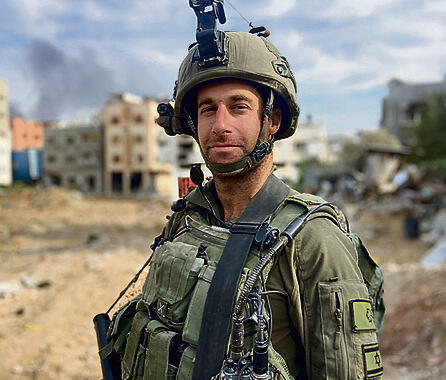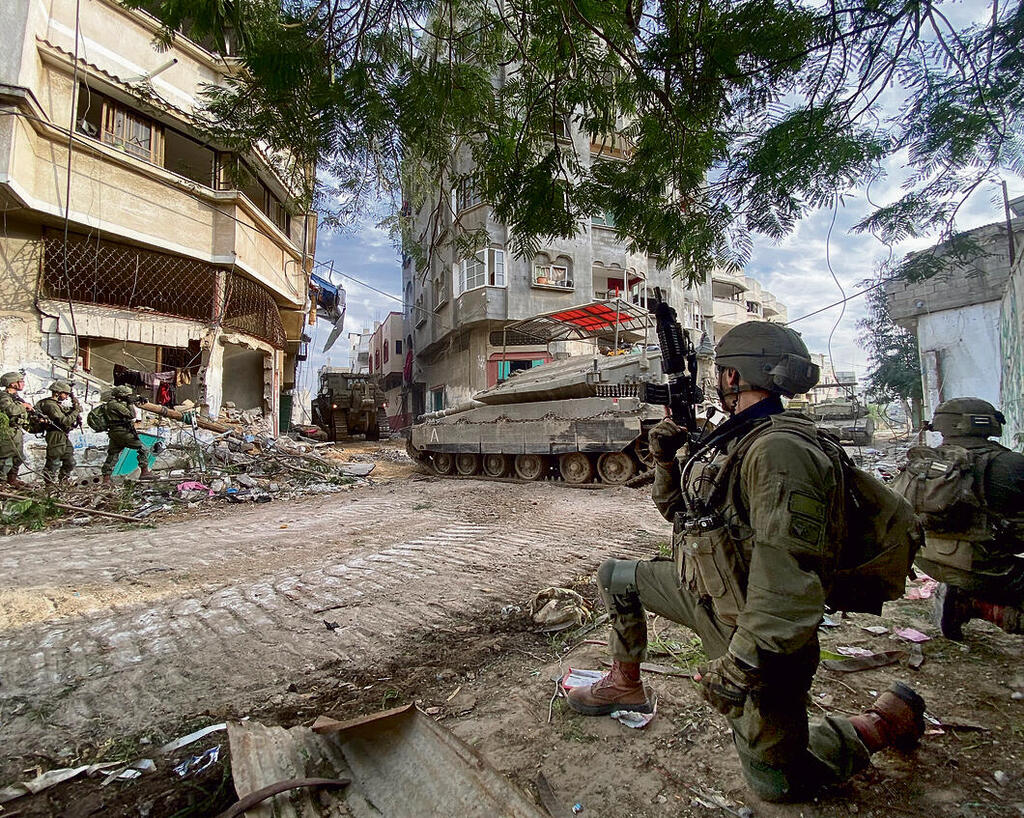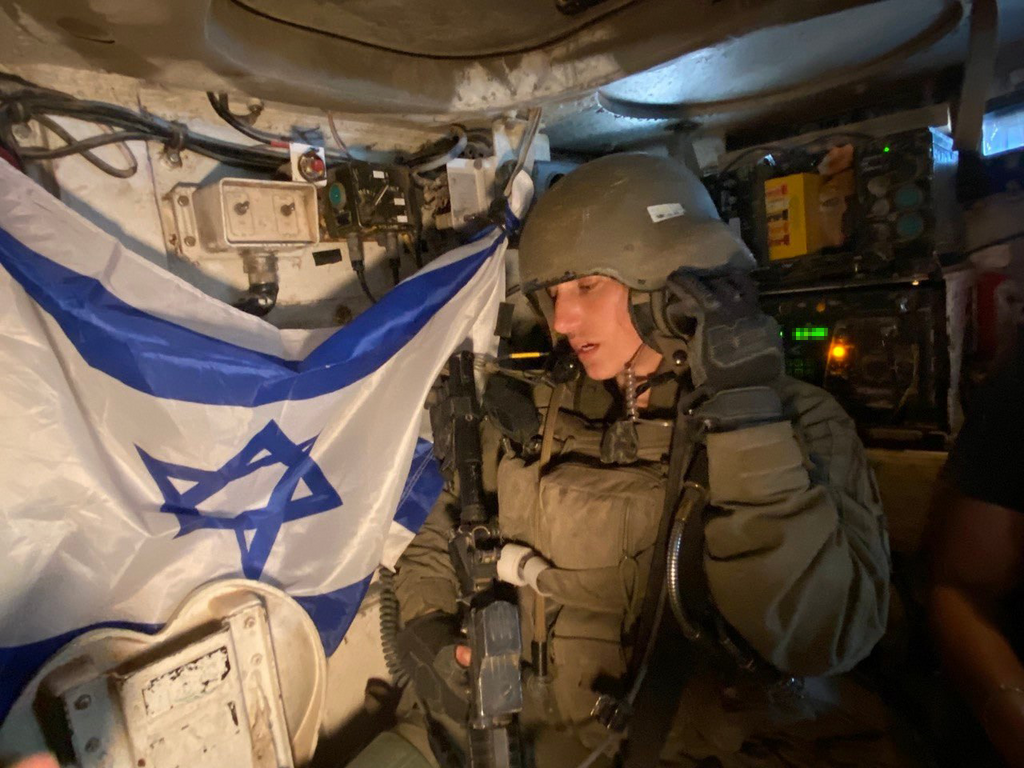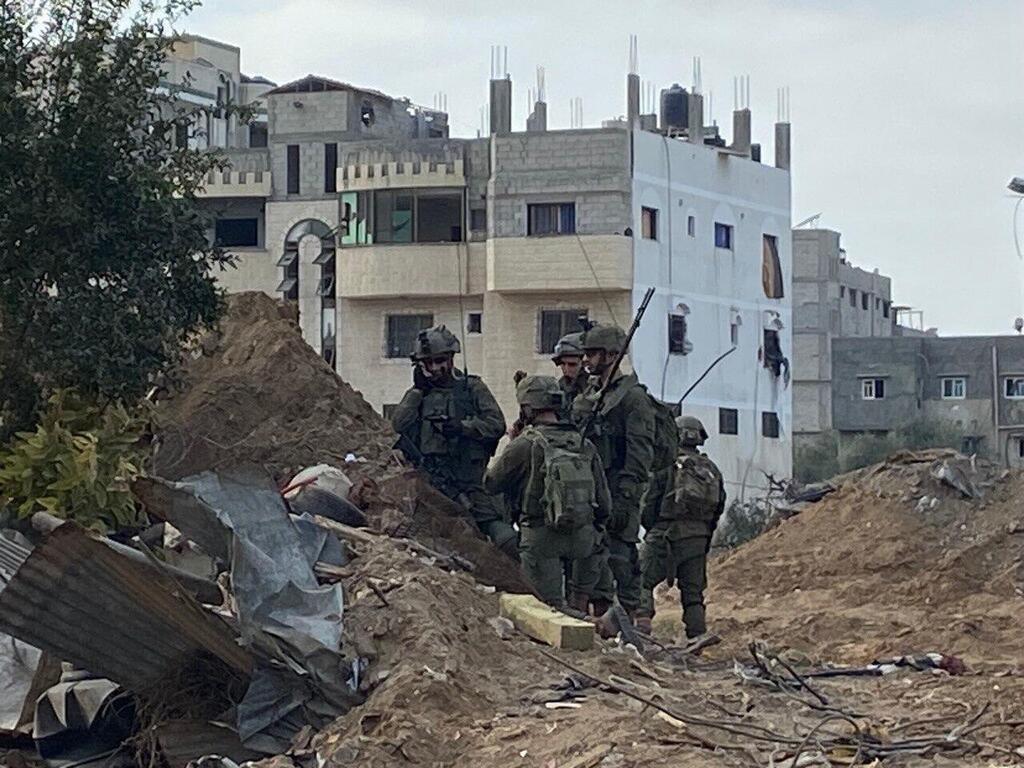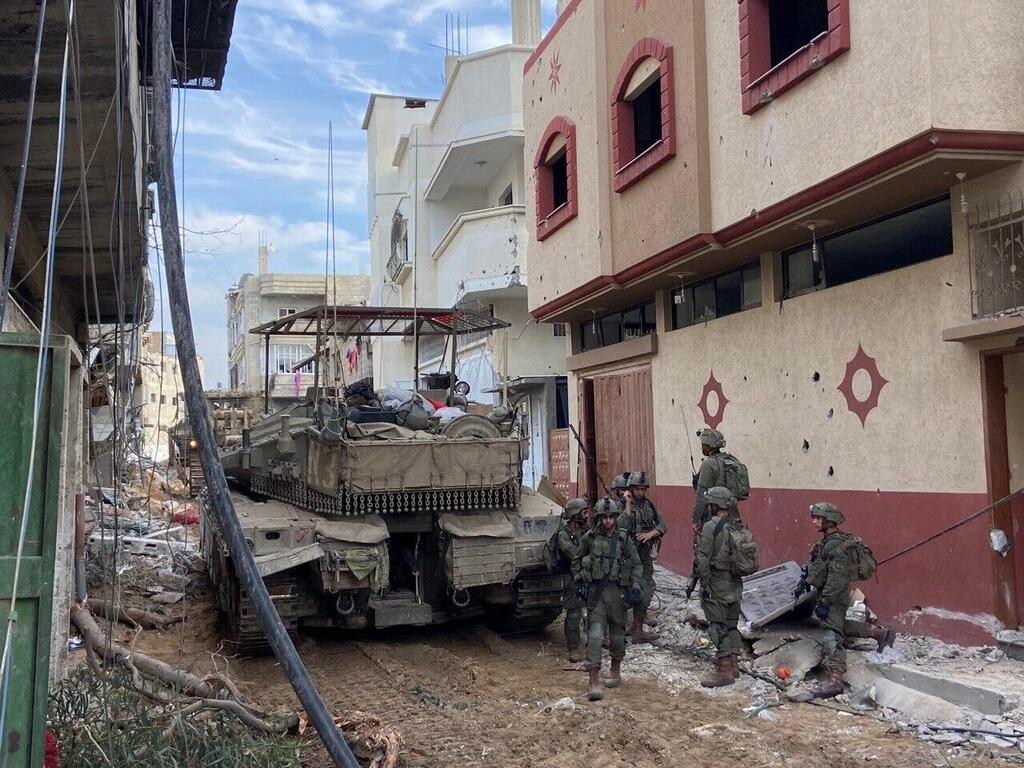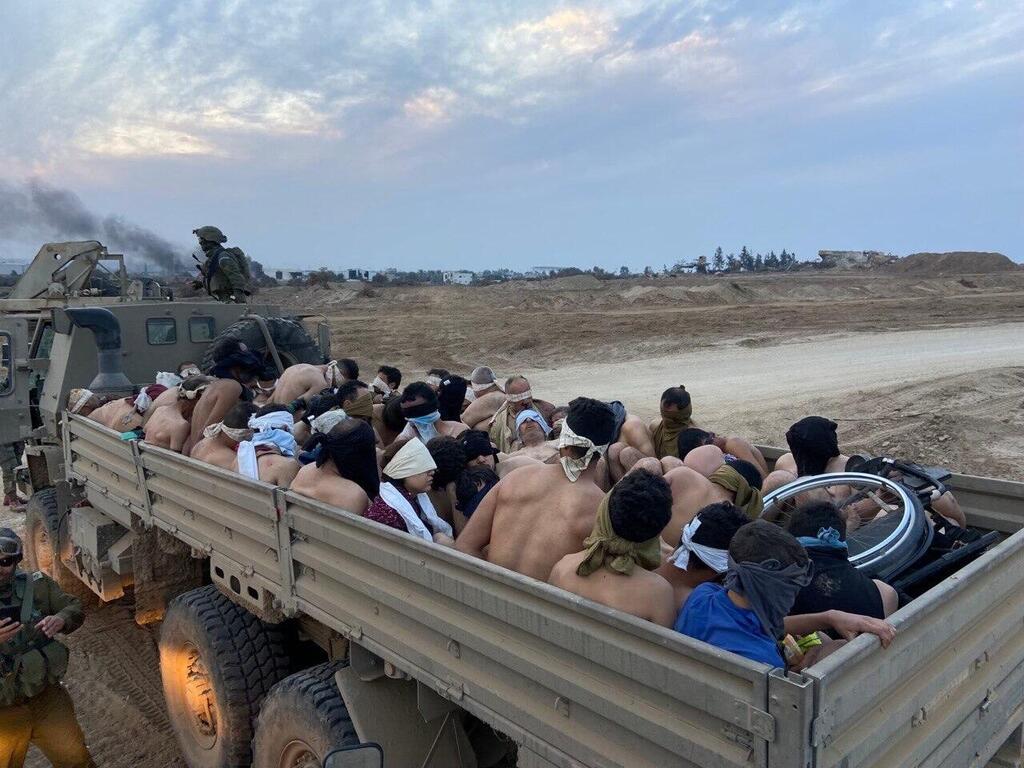We are standing at the foot of an earthen embankment in the heart of the Shijaiyah neighborhood in Gaza and talking to Lt. Col. Yoav, the commander of the 101st Paratrooper Battalion. The devastation around us is enormous. Black smoke billows from the few houses that remain on the trail. In the background is the sound of war. He tells us about the fighting he is conducting here over the last week until one of the officers informs him: "Sir, Company D engaged."
More stories:
Lt. Col. Yoav flips a switch in his head. The interview is interrupted and he radios the company commander and the tank division commander. "40 from commander, give me an assessment of the situation," he says. "Wiener, are you in touch with 40?"
This is already the third encounter on Friday and, after a month and a half of fighting in Gaza, the forces are already used to it. Three tanks come out of the shelter and rush toward the place of the encounter, 200 meters from us. After them comes The Bear, a D-9 bulldozer that tramples everything in its path. Three APCs, designed to evacuate casualties, are also advancing in case they are needed. In one of them sits Lt. Dr. Hagar, the battalion's doctor and a full-fledged soldier. In the second, is Dr. Olivia, a doctor in the reserves. Two more doctors are with the company that was engaged by Hamas.
We are moving forward with the battalion commander's task force, following the bulldozer and the tanks. A two-minute walk and we are at the entrance to the street where the fighting is taking place.
To our right is a barber shop and on the sign at the entrance are illustrations of bearded men. Next to it is a grocery store with empty shelves. An antique Subaru is peeking out of a garage. On the road, or what used to be a road, carcasses of cats, chickens and even a rabbit. An intense odor hangs in the air. And 100 meters in front of us, down the street, is war. Bursts of machine guns and small arms, soldiers between positions. Every now and then a huge explosion caused by a tank firing at the house where the terrorists are entrenched.
Almost an hour has passed since the skirmish began. The battalion commander allows us to move forward. One of the officers announces: "There is one dead terrorist and one alive who should be on the left." Up ahead lies the body of a terrorist who was just killed, still in a combat vest.
And amid this scene, one of the soldiers shouts to Gil the photographer: "Dude, can you take a picture?" They have already been in dozens of encounters and eliminated countless terrorists, but this is the first time they have encountered journalists.
Above us is a five-story building, with the heads of soldiers sticking out of its windows. They notice us and shout: "Shabbat Shalom, Am Yisrael Chai." One of them blows a kiss. "Who wants to say hello to home?" Gil asks, and several of them shout at the same time: "Mom, I love you. Father, I miss you." One of the soldiers makes the sign of a heart with his hand, and another announces: "Two more Saturdays until Yemenite soup, I'm coming." And, let's remember, this is happening during a battle.
Long minutes pass until the second terrorist is also eliminated and we ask the battalion commander to summarize the incident. He begins to speak, then receives a message on the radio. "Let's stop for a moment, there may be another terrorist," he says. He turns to the company commander and instructs him to "call on the tank division to fire a shell to the roof, and to continue scanning with the drone." The soldiers fire several tank shells that leave no chance for the last terrorist.
Returning to the battalion HQ, Lt. Col. Yoav sums up the encounter, which lasted almost two hours. "A shot was fired at our force that was on the offensive. At first one terrorist was identified, whom we killed, then we identified two more terrorists. Together with the armored forces, the engineering forces and the infantry forces with all their capabilities, we eliminated the other two terrorists," he said. If we weren't in an active war, he would announce: "As you were." But this is the routine of the paratroopers in Shijaiyah: fighting from house to house and encounter after encounter.
Enter and crush
This fighting takes its toll. The 101st Battalion lost soldiers and officers in the battles on October 7 and in the days that followed, as well as in operations inside Gaza. One of them is the late Maj. Jamal Abbas of Peki'in, a company commander who fell on November 18. "All the fallen are very dear to me and dear to us as a battalion, and their loss is a compass that tells us to go forward, to keep fighting. We draw a lot of strength from them," says Yoav.
I ask him if he has a message to convey to Yahya Sinwar. "I say this to all Hamas terrorists and also to their leader, on October 7 they made a historic mistake, which will lead to the end of this organization's path. And we, the good sons of the people of Israel, are here to carry it out and win. Nothing will stop the IDF, nothing will stop the paratrooper brigade and certainly not the 101st battalion."
It is natural to hear such statements from a battalion commander who decided to dedicate his life to the army, but we have also heard them from reserve fighters of the brigade. For example, we met Kfir Kadosh, a soldier in the Versano Team, at the brigade guardhouse on the outskirts of Shijaiyah, before we went into the heart of the combat zone. "I live in the settlement of Tzohar, in the Eshkol region, here beyond the fence," he says.
What happened to you on October 7?
"It hurts until now, but let's put it aside. We need to keep busy fighting and give them hell so we can go back to living on the moshav quietly, like before. Enter and crush. Simply crush."
What do you do in civilian life?
"I am the owner of the Mami club in Rishon Lezion. While I'm here fighting, the club is operating and I'm telling everyone: go and be happy. Go out, enjoy, restaurants, clubs. Go back to normal. This is part of our victory."
You have been in the reserves for two months. Doesn't it hurt the business?
"Wow, it's very difficult. Everything is fine with me, thank God, but I will have to spend money to get the business back in shape and that's not the solution. The government should start spending the money and give it to those who need it, because there are businesses that have been closed for a long time and they are suffering damages."
It's already noon and the Versano team is already preparing for the Shabbat meal. "On Friday, our team has a tradition," explains Kadosh. "We have to eat schnitzel matbucha. We are Moroccans, there is nothing we can do."
Do the Ashkenazim eat it too?
"They love it. Ashkenazim like Moroccan food more than the Moroccans do."
And who makes it, you?
"How would I make it? I don't know how to make a Nutella sandwich," he says before he concludes: "Am Israel, we are strong, proud, the paratroopers brigade leads the way, Hurray team Versano."
I'll be at his Bar Mitzvah
When we returned to the brigade shelter, we noticed an open truck loaded with Palestinian prisoners, their hands cuffed and their eyes covered, including a woman. "There were dozens of terrorists who came out with raised hands," said the battalion commander earlier. We learn from this that their spirit is breaking, and that strengthens us. There are also quite a few terrorists among them who participated in the October 7 attack."
Tomer, the APC bombardier, asks me to take a photo of him sending greetings to the family and send it to his parents. He hasn't seen the house in more than two months, and since he entered Gaza he hasn't spoken to them.
Yoav the commander hasn't spoken to his family for weeks either, and in his case, it's almost unimaginable. "My wife was nine months pregnant on October 7 and from there she continued accompanied by her parents," he says. "Our sweet son Ivri was born a few days after the war began. I was privileged to be in the delivery room and at the brit milah, but I haven't seen him since. And of course I miss him and waiting to really get to know him."
When do you think that will happen?
"We will be here for as long as it takes, whether it is in Shijaiyah or in other places, until we complete this important task."
One of the officers tells him: "Let's hope you will be able to get out of here for his Bar Mitzvah."



